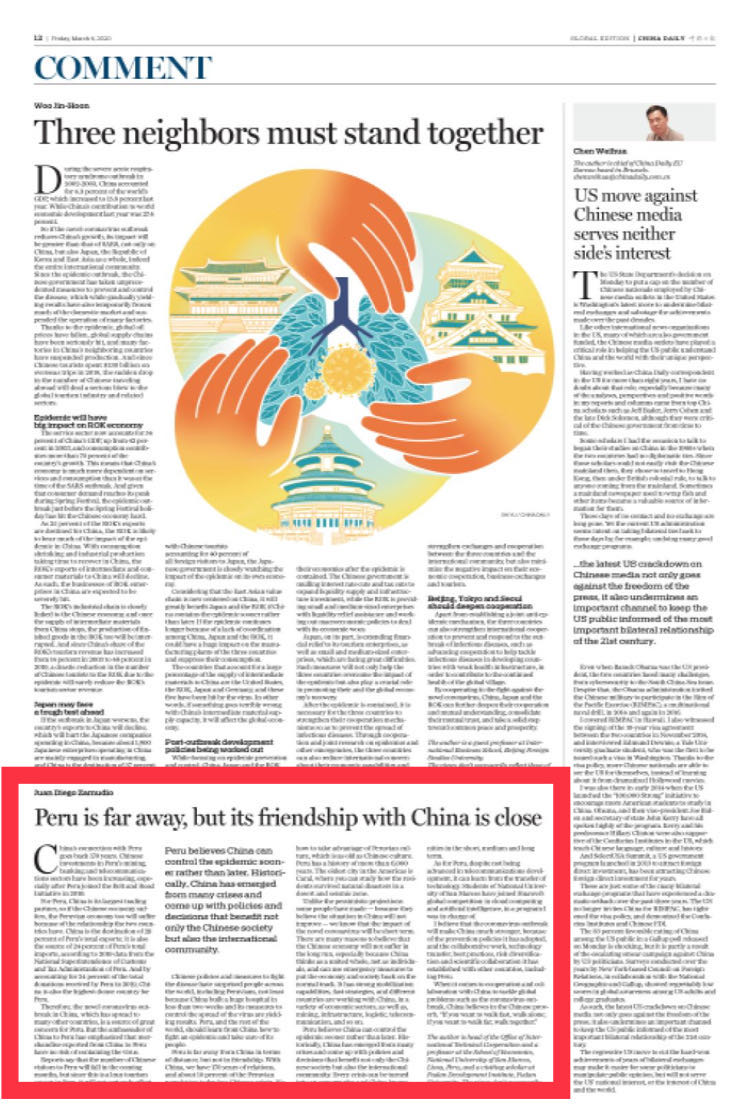Author: Release date:2020-03-06 16:34:01Source:发展研究院英文

China's connection with Peru goes back 170 years. Chinese investments in Peru's mining, banking and telecommunications sectors have been increasing, especially after Peru joined the Belt and Road Initiative in 2019.
For Peru, China is its largest trading partner, so if the Chinese economy suffers, the Peruvian economy too will suffer because of the relationship the two countries have. China is the destination of 29 percent of Peru's total exports; it is also the source of 24 percent of Peru's total imports, according to 2019 data from the National Superintendence of Customs and Tax Administration of Peru. And by accounting for 24 percent of the total donations received by Peru in 2019, China is also the highest donor country for Peru.
Therefore, the novel coronavirus outbreak in China, which has spread to many other countries, is a source of great concern for Peru. But the ambassador of China to Peru has emphasized that merchandise exported from China to Peru have no risk of containing the virus.
Reports say that the number of Chinese visitors to Peru will fall in the coming months, but since this is a lean tourism season in Peru, it will not seriously affect the Peruvian tourism industry.
Chinese policies and measures to fight the disease have surprised people across the world, including Peruvians, not least because China built a huge hospital in less than two weeks and its measures to control the spread of the virus are yielding results. Peru, and the rest of the world, should learn from China how to fight an epidemic and take care of its people.
Peru is far away from China in terms of distance, but not in friendship. With China, we have 170 years of relations, and about 10 percent of the Peruvian population today has Chinese origin. No wonder there have been discussions on how to take advantage of Peruvian culture, which is as old as Chinese culture. Peru has a history of more than 6,000 years. The oldest city in the Americas is Caral, where you can study how the residents survived natural disasters in a desert and seismic zone.
Unlike the pessimistic projections some people have made-because they believe the situation in China will not improve-we know that the impact of the novel coronavirus will be short term. There are many reasons to believe that the Chinese economy will not suffer in the long run, especially because China thinks as a united whole, not as individuals, and can use emergency measures to put the economy and society back on the normal track. It has strong mobilization capabilities, fast strategies, and different countries are working with China, in a variety of economic sectors, as well as, mining, infrastructure, logistic, telecommunication, and so on.
Peru believes China can control the epidemic sooner rather than later. Historically, China has emerged from many crises and come up with policies and decisions that benefit not only the Chinese society but also the international community. Every crisis can be turned into an opportunity, and China knows best how to do that, by creating opportunities in the short, medium and long term.
As for Peru, despite not being advanced in telecommunications development, it can learn from the transfer of technology. Students of National University of San Marcos have joined Huawei's global competition in cloud computing and artificial intelligence, in a program I was in charge of.
I believe that the coronavirus outbreak will make China much stronger, because of the prevention policies it has adopted, and the collaborative work, technology transfer, best practices, risk diversification and scientific collaboration it has established with other countries, including Peru.
When it comes to cooperation and collaboration with China to tackle global problems such as the coronavirus outbreak, China believes in the Chinese proverb,If you want to walk fast, walk alone; if you want to walk far, walk together.
The author is head of the Office of International Technical Cooperation and a professor at the School of Economics, National University of San Marcos, Lima, Peru, and a visiting scholar at Fudan Development Institute, Fudan University. The views don't necessarily represent those of China Daily.